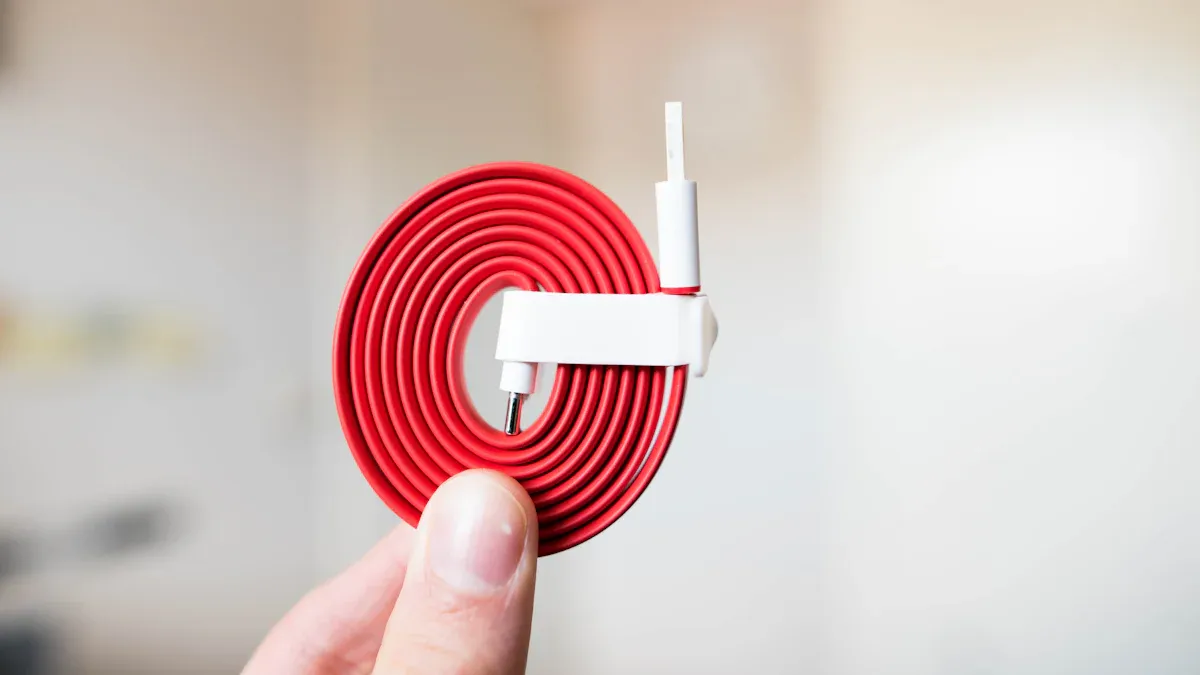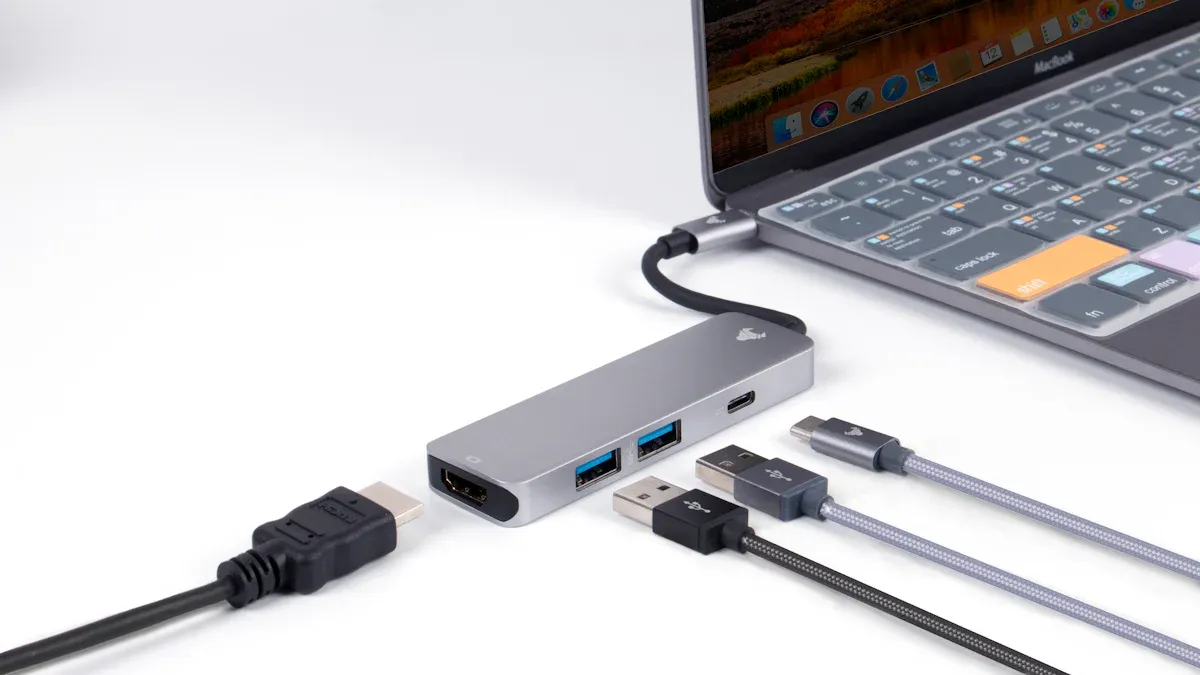Custom USB charging cables are becoming essential in today’s technology-driven world. The USB cable market, valued at $12.7 billion in 2021, is expected to reach $69.9 billion by 2031, growing at a rate of 20.2%. This surge reflects the rising demand for consumer electronic devices, wearable technology, and internet-connected devices. These cables also help reduce electronic waste. Renewable designs allow you to repair damaged cables, saving resources and extending their lifespan. By choosing custom options, you contribute to sustainability while meeting your device needs.
Advancements in Custom USB Charging Cables
Advanced Materials for Durability and Safety
The materials used in custom USB charging cables have seen significant advancements. Manufacturers now incorporate plant-based materials like corn and sugarcane into cable production. These materials reduce reliance on petroleum-based plastics, making the cables more eco-friendly. Additionally, these cables can withstand up to 20,000 bends, ensuring long-term durability. This durability minimizes the need for frequent replacements, which helps reduce electronic waste.
Another innovation involves the use of high-elastic TPU protective layers. These layers enhance the cable’s performance by boosting transfer speeds and reducing data loss. They also improve reliability by providing immunity to electromagnetic interference (EMI) and electromagnetic susceptibility (EMS). These features ensure that your devices receive consistent power and high-speed data transfer without interruptions.
| Feature | Description |
|---|---|
| Material | 40% plant-based materials (corn, sugarcane) |
| Durability | Withstands up to 20,000 bends |
| Environmental Impact | Reduces petroleum-based plastic usage |
| Material | High elastic TPU protective layer |
| Performance | Boosts transfer speeds and reduces data loss |
| Reliability | EMI and EMS immunity for improved data quality |
These advancements not only improve the safety and durability of USB cables but also align with the growing demand for sustainable technology solutions.
Innovations in USB-C Cable Design
USB-C cables have revolutionized the way you charge and connect your devices. One of the most notable innovations is the integration of charging power delivery technology. This technology enables fast charging by delivering higher power levels safely. For example, the Electronically-Marked Cable Assembly (EMCA) controller, introduced in September 2023, supports protection up to 54 volts. This ensures that your devices charge quickly without compromising safety.
Another breakthrough is the development of bio-based USB-C charging cables. These cables, made from renewable materials like corn and sugarcane, were launched in 2022. They combine sustainability with high performance, meeting the needs of environmentally conscious consumers.
| Innovation Type | Description |
|---|---|
| Charging Power Delivery Technology | Fast-charging technology based on the USB-C standard, with advancements like the Electronically-Marked Cable Assembly (EMCA) controller launched by Infineon Technologies in September 2023, supporting protection up to 54 V. |
| Bio-based USB-C Charging Cables | Cables made from plant-based materials, such as corn and sugarcane, introduced by Anker Innovations Co Ltd. in September 2022. |
These innovations highlight the versatility and efficiency of USB-C cables, making them a preferred choice for consumer device charging.
Customization for Branding and User Experience
Custom USB charging cables offer unique opportunities for branding and enhancing user experience. Businesses can design cables with their logos, colors, and unique patterns, turning everyday accessories into marketing tools. This customization not only promotes brand visibility but also creates a sense of exclusivity for users.
From a functional perspective, custom cables can be tailored to meet specific device requirements. For instance, you can choose cables with varying lengths, connectors, or power delivery capabilities to suit your needs. This level of customization ensures compatibility with a wide range of devices, enhancing convenience and usability.
Moreover, the growing adoption of USB-C technology has made it easier to create unified charger interfaces. This simplifies your charging experience by reducing the need for multiple cables. As a result, you can enjoy a seamless and efficient charging process, whether at home, work, or on the go.
Custom USB charging cables combine practicality with personalization, offering solutions that cater to both individual and business needs.
Challenges in Charging Cable Production
Material Sourcing and Limitations
Producing USB charging cables requires high-quality materials. However, sourcing these materials can be challenging. Many manufacturers rely on metals like copper and aluminum for conductivity. These metals are expensive and often subject to price fluctuations in the global market. You may also notice that eco-friendly materials, such as plant-based plastics, are gaining popularity. While these materials reduce environmental impact, they are not always widely available. Limited supply chains for sustainable resources can slow down production.
Another issue is the need for specialized components in type-C cables. For example, E-markers, which are essential for USB-C cable assemblies, must meet strict standards. These components ensure safety and compatibility but add complexity to the sourcing process. As demand for type-C cables grows, finding reliable suppliers becomes even more critical.
Manufacturing Complexities in Custom Cables
Custom USB charging cables require precise manufacturing processes. Each cable must meet specific design and performance requirements. For instance, type-C cables must support fast charging and data transfer. This involves integrating advanced technologies like power delivery and EMI shielding. These features enhance your charging experience but make production more complex.
Manufacturers also face challenges in maintaining quality control. Custom designs often involve unique lengths, connectors, and materials. Ensuring consistency across these variations requires advanced machinery and skilled labor. Small errors in production can lead to faulty cables, which may affect your devices’ performance. Balancing customization with efficiency remains a significant hurdle for the industry.
Supply Chain Optimization for USB-C Cables
The supply chain for USB-C cables faces several optimization challenges. High demand for type-C cables has increased pressure on manufacturers to deliver products quickly. However, strict regulations for USB-C cables add complexity. For example, EPR (Extended Power Range) cables must meet specific voltage and power ratings. These include a minimum functional voltage of 53.65V and a mandatory 240W mark. Manufacturers must also use capacitors rated at 63V to ensure safety.
| Key Points | Description |
|---|---|
| E-markers | Must be used in EPR cable assemblies. |
| Power Rating | USB-C cable assemblies can only be rated 60W or 240W. |
| Voltage | Minimum functional voltage of the cable in an EPR cable is 53.65V. |
| Capacitor Rating | Minimum bypass capacitor voltage rating for EPR cable is 63V. |
| Mandatory Mark | Mandatory use of 240W (EPR) mark. |
| Arcing Mitigation | Recommended for EPR cables. |
These requirements ensure safety and performance but complicate the supply chain. You may notice delays in the market due to these strict standards. To address this, manufacturers are investing in automation and better logistics. These improvements aim to streamline production and meet the growing demand for consumer device charging solutions.
Future Trends in Custom USB Charging Cables
Eco-Friendly and Sustainable Materials
The future of custom USB charging cables is leaning heavily toward sustainability. Manufacturers are adopting biodegradable and recyclable materials like thermoplastic elastomers (TPE) as alternatives to traditional PVC. These materials not only reduce environmental impact but also align with the growing consumer demand for eco-friendly products. Many people are willing to pay more for sustainable options, making this a significant market trend.
You may also notice a shift toward circular economy principles in cable production. Companies are designing products for easier recycling and implementing take-back programs to minimize waste. This approach ensures that old cables can be repurposed, reducing the strain on natural resources.
For eco-conscious consumers, the availability of biodegradable or recyclable charging cables offers a responsible choice. These innovations cater to your desire for environmentally friendly solutions without compromising on performance or durability.
- Key Trends in Sustainable Materials:
- Biodegradable and recyclable materials like TPE.
- Circular economy practices, including take-back programs.
- Rising consumer preference for eco-friendly charging solutions.
Smart Technology Integration in Charging Cables
Smart technology is transforming the way you interact with charging cables. Recent advancements in Demand Side Management (DSM) technologies allow for real-time adjustments in energy usage. These systems, powered by AI and IoT devices, enable continuous monitoring and control of energy consumption. For example, smart meters integrated into USB Type-C cables can optimize power delivery, ensuring efficient charging while reducing energy costs.
Smart charging solutions also play a crucial role in electric vehicle (EV) charging. Integrated systems enhance grid reliability by optimizing the use of renewable energy sources. They reduce peak electricity demand and maintain power quality, benefiting both EV drivers and the broader energy grid.
For your everyday devices, smart charging cables offer features like automatic power adjustments and compatibility with multiple devices. These innovations improve charging efficiency and ensure universal compatibility, making them a valuable addition to your tech arsenal.
- Benefits of Smart Technology in Charging Cables:
- Real-time energy management with AI and IoT integration.
- Enhanced grid reliability through optimized power usage.
- Improved charging efficiency and universal compatibility for devices.
Modular and Multi-Functional Cable Designs
The demand for modular and multi-functional cable designs is on the rise. These cables offer flexibility and adaptability, catering to the needs of various industries like IT, telecom, and construction. For example, modular USB Type-C cables allow you to swap connectors or adjust lengths, providing a tailored solution for your specific requirements.
In addition to customization, these designs improve installation efficiency and durability. Innovations in cable management systems focus on reducing installation times and optimizing space, making them ideal for both personal and professional use.
The market for modular cables is expanding rapidly, driven by the need for scalable solutions that can evolve with technological advancements. Whether you’re looking for a cable that supports fast charging, high-speed data transfer, or universal compatibility, modular designs offer a versatile and future-proof option.
- Key Features of Modular Cable Designs:
- Swappable connectors and adjustable lengths.
- Scalable solutions for evolving technology needs.
- Enhanced durability and installation efficiency.
Advancements in custom USB charging cables are reshaping how you power your devices. Addressing production challenges, such as adopting GaN power supply technology and collaborating with global manufacturers, ensures reliable supply chains. These innovations not only meet growing demand but also pave the way for sustainable and efficient charging solutions in the future.
FAQ
What makes custom USB charging cables different from standard ones?
Custom cables offer tailored features like branding, specific lengths, and unique connectors. These options enhance compatibility, durability, and user experience compared to standard cables.
Are eco-friendly USB cables as durable as traditional ones?
Yes, eco-friendly cables use advanced materials like TPE and plant-based plastics. These materials ensure durability while reducing environmental impact, making them a sustainable and reliable choice.
Tip: Look for certifications like RoHS or CE to confirm the quality of eco-friendly cables.
Can modular USB cables support fast charging?
Absolutely! Modular cables often include advanced technologies like power delivery. These features ensure fast charging and high-speed data transfer, meeting modern device requirements.



